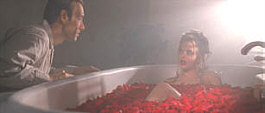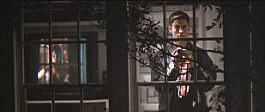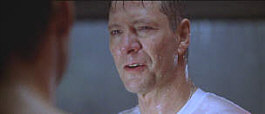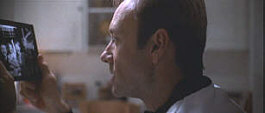American Beauty appears in an aspect ratio of approximately 2.35:1 on
this single-sided, double-layered DVD; the image has been enhanced for 16X9
televisions. Overall the picture looked pretty good but I found it mildly
disappointing.
Sharpness caused some problems. For the most part, the image seemed
acceptably clear and well-defined, but a moderate amount of softness and
murkiness interfered with a number of shots. These concerns were mostly
prevalent during some low-light or wider scenes. Moiré effects and jagged
edges presented small issues, and I saw moderate artifacts from the
anamorphic downconversion on my 4X3 TV. Print flaws were minor but
surprisingly heavy for a major studio movie from 1999; at times I witnessed
light grain and some black grit, and while these were never more than small
nuisances, they seemed excessive for this recent a film.
 Colors were a strong point of American Beauty. They appeared
consistently true and correct, with some especially rich and vibrant reds at
the forefront; that was especially important here since roses play such a
key role in the film. Black levels seemed reasonably dark and deep but
could appear slightly bland at times, and shadow detail occasionally was
slightly murky and drab; these low-light situations generally seemed clear
and accurate, but the lack of great depth to the dark tones offered some
minor concerns. Ultimately, American Beauty presented an acceptable
image but not one that I thought looked exceptionally good.
Colors were a strong point of American Beauty. They appeared
consistently true and correct, with some especially rich and vibrant reds at
the forefront; that was especially important here since roses play such a
key role in the film. Black levels seemed reasonably dark and deep but
could appear slightly bland at times, and shadow detail occasionally was
slightly murky and drab; these low-light situations generally seemed clear
and accurate, but the lack of great depth to the dark tones offered some
minor concerns. Ultimately, American Beauty presented an acceptable
image but not one that I thought looked exceptionally good.
On this DVD, we find two separate soundtracks. We get both Dolby Digital
5.1 and DTS 5.1 mixes. Personally, I dread having to contrast and compare
the two, because it's almost a no-win situation. The various camps have
become so antagonistic, and the whole issue has been so heated, that any
impressions I or others may provide are inflated to exaggerated importance
and meaning.
In general, I've found DD and DTS mixes to seem fairly similar, though the
DTS tracks usually get a slight nod. The only occasions I can recall in
which I felt there was a genuinely significant difference between the two
occurred for two Spielberg films: Jaws and Saving Private Ryan. (In the latter case, my letter grade was an
"A+" for both, but I still thought the DTS track was substantially better
than the DD one; because of the rating system we use, there was no way I
could reflect that in my grade, unfortunately.)
Time to toss a little more fuel on the fire: I found the DTS mix of
American Beauty to sound significantly cleaner and smoother than the
DD track. Both offered fairly similar soundfields. Unsurprisingly, the
audio used the forward channels for most of its information. These speakers
showed nice breadth and spread the sound appropriately across the spectrum;
they created a modest but effective and engaging forward presence. The
surrounds generally provided moderate reinforcement for these front
channels; they operated mainly as extensions of the forward soundstage and
bolstered the mix adequately in that regard.
 The differences between the two soundtracks stemmed from the quality of
their audio. The DTS track featured significantly more crisp and detailed
audio. Dialogue showed the largest differences. On the DTS side, I heard
consistently clear and distinct speech that seemed warm and intelligible and
displayed no signs of distortion. However, the DD dialogue came across as
somewhat brittle and edgy at times; although it seemed listenable and clear,
the speech sounded less natural.
The differences between the two soundtracks stemmed from the quality of
their audio. The DTS track featured significantly more crisp and detailed
audio. Dialogue showed the largest differences. On the DTS side, I heard
consistently clear and distinct speech that seemed warm and intelligible and
displayed no signs of distortion. However, the DD dialogue came across as
somewhat brittle and edgy at times; although it seemed listenable and clear,
the speech sounded less natural.
Effects and music were reasonably similar on both tracks except when we
discerned the low end. For both DD and DTS, effects sounded realistic and
clean and lacked noticeable distortion, and the score was detailed and
smooth. Highs were clear and bright on both tracks and lacked excessive
treble or any signs of muddiness.
The bass was where the two differed the most. Although the Dolby mix
displayed some fairly deep low end at times - mainly from the music - the
bass appeared vague and muddled; it should have been more taut and distinct.
The DTS track accomplished those goals as it seemed clean and solid at all
times. This version lacked the tentative qualities I heard on the DD mix
and it acquired additional depth and power. Ultimately, both soundtracks
serve the movie adequately, but I found the DTS mix significantly preferable
to the Dolby Digital edition.
DreamWorks are calling the DVD of American Beauty "The Awards
Edition". Frankly, I'm not sure what that means, since there's no other
version, and "The Awards Edition" doesn't explain much about the content,
but I guess it's just another name for a special edition.
As such, we find a smattering of decent supplemental features on the DVD.
First up in a running audio commentary from director Sam Mendes and writer
Alan Ball. Actually, that's not really true, since Mendes strongly
dominates the proceedings. Ball says nearly nothing during the track; he
offered one or two semi-substantial remarks and also mutters words similar
to "I loved that part" on occasion, but that's it - we hear nothing else
from Ball.
 As for Mendes, he provides a fairly decent commentary virtually on his own.
He combines details about the production with his opinions of parts of the
film and some interpretation of it. Probably the most useful are his
statements about different ways the movie could have gone; from deleted
scenes to alternative interpretations, he gives us a nice look at some
unused possibilities. Mendes provides an above-average commentary but not
one that I found tremendously engaging or informative.
As for Mendes, he provides a fairly decent commentary virtually on his own.
He combines details about the production with his opinions of parts of the
film and some interpretation of it. Probably the most useful are his
statements about different ways the movie could have gone; from deleted
scenes to alternative interpretations, he gives us a nice look at some
unused possibilities. Mendes provides an above-average commentary but not
one that I found tremendously engaging or informative.
The same goes for American Beauty: Look Closer, a 21-minute and
50-second featurette about the film. The program involves all the prominent
cast and crew such as Mendes, Ball, Spacey, Bening, and others, and it
offers a decent view of how the movie got made. We get the usual mix of
interview snippets, film clips and behind the scenes footage, and it all
adds up to a fairly promotional and mildly superficial but watchable
program.
Storyboard Sequences provides a discussion of the use of this form of art
during American Beauty. We hear a conversation between director
Mendes and director of photography Conrad L. Hall. This 61-minute and
five-second piece shows a storyboards on the left side of the screen and
their filmed counterparts on the right. We usually see three boards at a
time and get about 43 screens in all for a total of roughly 120 boards (some
screens have fewer than three boards on them).
While these comparisons are interesting, it's the commentary from Hall and
Mendes that makes this feature valuable. Many films use storyboards but we
don't hear much about how the filmmakers work from them, so this discussion
adds valuable information and does so in a genial and engaging manner.
Since the two interact in a much more involving and compelling manner, it's
too bad the screen-specific commentary didn't feature Hall with Mendes
instead of Ball; maybe Hall was slated to appear but a typo resulted in Ball's inclusion.
A few other common DVD features appear as well. We get two theatrical
trailers for AB plus Cast and Crew Biographies. In that area, we
discover listings for 10 actors and for seven crew members, all of which
include fairly ordinary and brief descriptions of the participants' careers.
 Production Notes features additional text that provides a pretty decent
overview of the making of AB. More interesting are some notes from
Mendes that appear in the DVD's booklet; these show a somewhat more personal
look at his thoughts about the film.
Production Notes features additional text that provides a pretty decent
overview of the making of AB. More interesting are some notes from
Mendes that appear in the DVD's booklet; these show a somewhat more personal
look at his thoughts about the film.
Finally, AB includes some DVD-ROM content. Most significant is
"Script and Screen", a feature that allows you to watch the movie alongside
the complete screenplay and storyboards. It puts the script on the right
side of the screen, with the movie in the middle left, and storyboards (when
available) on the bottom left. Oddly, on two different machines that I
used, the movie itself appeared in the upper left corner and the box in
which it should have been seen was blank. Despite this glitch, the feature
worked pretty well and should be useful for anyone who wants to see the ways
the story was transformed into a film.
The DVD-ROM area also includes a weblink for doesn't work. Click "Go
Online!" and you're sent to here. Maybe it'll
function eventually, but right now (October 8 2000), it's a dead link.
Although I still feel American Beauty is an overrated film, it
clearly is unusual and entertaining. It's a fairly thought-provoking little
affair that should stay with you for a while after it ends. The DVD
provides decent but flawed picture plus very good DTS sound and adequate
Dolby Digital audio. We also find some strong extras in this package. I
don't know if American Beauty merits a purchase, but it definitely
deserves a screening.

